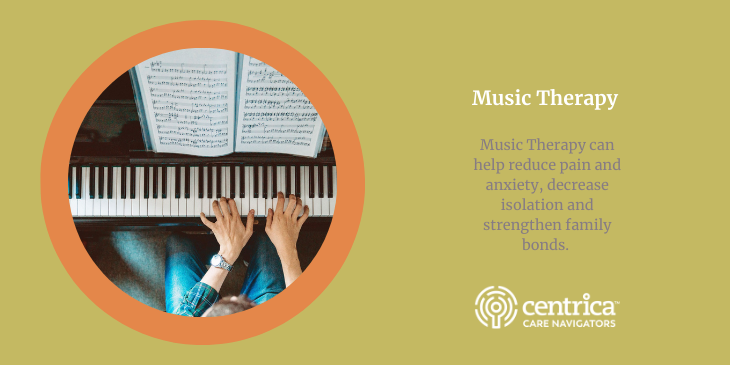Understanding the role of Music Therapist at Centrica Hospice
At Centrica Care Navigators, a music therapist is part of the team assigned to you at the start of your hospice experience. They’ll visit you at home, in a long term facility or a specialized care facility. Hospice music therapy offers a compassionate and non-invasive approach to end-of-life care. It integrates your musical preferences with your cultural background and spiritual beliefs to respect your dignity and celebrate your life. As you learn more about what to expect with Centrica Hospice, you’ll find a pervasive theme of caring.
“Music therapy helps me focus on something besides pain. It makes me completely forget about it. I focus on the music and my soul. It’s a wonderful relief from pain. It’s one therapy that you can share with friends and family. It’s a meaningful way for us to be together that takes us away from the everyday goings on. I feel it adds a richness and depth, something nothing else can do. There’s nothing else quite like music.” A Centrica Hospice client.
Patients can benefit regardless of their musical experiences and background.
The universal appeal of music makes it possible for nearly every individual to relate to music and participate in music therapy in meaningful ways. Clinical and empirical evidence reports that it is effective for meeting the physical, emotional, and spiritual needs of patients and families. They may benefit from actively engaging in music therapy interventions such as song-writing, singing, music-making, improvisation, making musical choices or moving to music. Patients may also benefit by receiving the music through active music listening, music focused relaxation, music and imagery or live music entrainment. Hospice music therapy provides actively dying patients and their families with music that supports a peaceful death. They use a variety of instruments that may include guitar, harp, keyboard, autoharp, dulcimer, tone chimes, tambourines, maracas, egg shakers and other rhythm instruments.
Hospice Music therapy provides pain management, emotional and spiritual support.
Music therapy is used to:
- Reduce physical symptoms of pain, agitation and shortness of breath
- Address and alleviate feelings of depression, fear, isolation, disorientation, confusion, anxiety, loss of control, loss of independence and loneliness
- Support spiritual beliefs and practices
- Improve quality of life
- Provide emotional support to families
- Provide opportunities for meaningful interactions among family members
- Provide respiratory entrainment and alleviation of anxiety during removal from ventilators and breathing-related crises
- Leave a legacy
- Inspire life review
- Discover meaning from the dying process
- Provide therapeutic interventions addressing grief and loss
Our Music Therapists are degreed and certified professionals.
They are graduates from one of the American Music Therapy Association’s approved music therapy degree programs and have achieved Board Certification in music therapy. In addition to the MT-BC credential, other recognized professional designations are Registered Music Therapist (RMT), Certified Music Therapist (CMT), and Advanced Certified Music Therapist (ACMT) listed with the National Music Therapy Registry.
Our Mission is to guide and support individuals and their caregivers coping with illness, aging, dying, and loss by providing compassionate medical, emotional, spiritual, and personal care.




